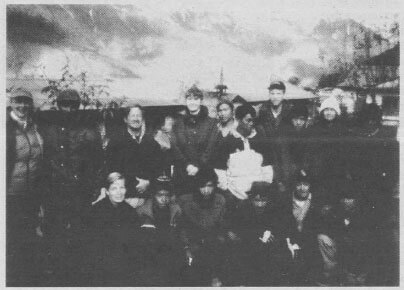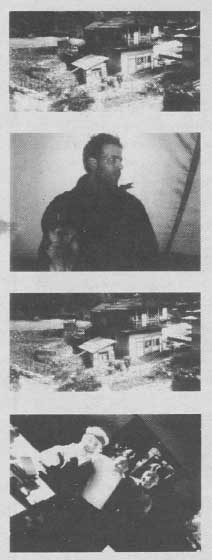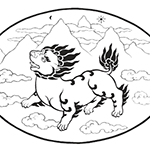| The following article is from the Summer, 1998 issue of the Snow Lion Newsletter and is for historical reference only. You can see this in context of the original newsletter here. |
by Tiah Foster, M.D.
When a man called me at work and asked, Do the words Mani Rimdu mean anything to you? my immediate answer was, Do you mean I won?
I was thrilled and thought it a dream come true. I had just won an all expenses-paid trip to Nepal (paid for by the Snow Lion trekking company out of Salt Lake City, Utah and sponsored by Snow Publications of Ithaca, NY.). We would trek for a week in the Himalayas and go up to Tengboche to see the annual Mani Rimdu Festival.
Then reality set in. I realized I was no longer the thin runner I used to besome negative karma had caught up with me and I had had two cervical neck injuries. No matter how you looked at it, I was FAT.
So I called Ron Barness at Snow Lion and told him that I'd hiked out of the Grand Canyon from Phantom Ranch but now I was 55 and pear-shaped. He said he thought I could do it. .
From top to bottom: The group on the last day; KitchenCamp 1; Steve Brothers, the U.S. guide, with his new dog Kimboki from Tengboche; Lodge, with patio by trail, where the author stayed in Lukla; The author and two friends
The Rehabilitation Center where I work set a program for me, especially to strengthen my legs. A friend who is a world-class climber and also a physician advised me to climb lots of stairs. What no one told me was to climb the steps two and three at a time. Remember that. This is the single most important piece of advice I can give you if you ever want to take this trip.
When I arrived in Kathmandu I was met by the folks from Snow Lion. Our group ranged from the early 30s to the 70s. But everyone was miles more fit than me. Steve Brothers would be our guide from Snow Lion. He spoke Nepali and Hindi and was from the U.S. I immediately liked him.
The flight up was easy. At Lukla we met our Sidhar, Potachie, a native Sherpa who has been leading treks for over 25 years. He and his Sherpas were all thoroughly professional, kind and helpful. We had a quick lunch in a hotel, our first taste of cabbage, carrots, onions, potatoes and eggs done in what would later seem like an infinite number of ways. It tasted great. Then we headed out.
Everyone passed me like I was standing still. Within less than a mile, I knew I was in trouble. The steps up and down were like double height and in some areas were triple height. Then it began to rain. And rain. Potachie and another Sherpa came back to check up on me and insisted that I change into something warm and dry right there. There are no changing rooms on the trail. So off went the wet stuff and on went the dry, plus a down parka, I was fortunate they insisted, as without the warm dry layer, I could have been in real trouble with hypothermia as the sun went down. Eventually I came within sight of the campsite. All I had to do was cross a narrow swinging foot-bridge. That first trip across took ages (but as the week wore on, it became a piece of cake to trot across the swaying bridge without hanging on).
I went to bed feeling really down, as I didn't think I was going to make it. I had dreamed of Namche and Tengboche. As a doctor, I thought I had a medical kit outfitted for everything, but I had not packed a needle and syringe, xylocaine and cortisone so I could inject my wildly inflamed hip bursa. I finally decided to go back to Lukla in the morning and stay there until the others returned.
The first day I just slept. The room had no heat, light, water or a bathroom, but it was clean. On the following day, I began to look around and ask questions. Very few words of English were spoken and I quickly got on to functional Nepali. The children were especially helpful and patient with me.
One of the children said she would take me to the monastery, high on a hill. She bobbed and jumped along the trail and was nimble as the proverbial mountain goat. I trundled along with my Lekhi walking stick, another definite MUST. The monastery housed a large statue of Padmasambhava and a smaller one of Tara. The area seemed self-sufficient with a garden off to one side. Shoes on the doorstep were Nike, of course. Two young boys showed us around.
Over several days I had a sense of life in the mountains as winter was coming on. Women were in the fields pulling all their plots of carrots to store in root cellars for the winter. Children were harvesting pine needles for the animals in the barns. Most of the time, everyone was in bed by 8 P.M and up at sunrise.
I would spend part of my day doing daily Buddhist practice and sitting in the sun. If people stopped and they spoke a language I understood, we visited. I used my French, Spanish, and Japanese regularly.
By day five, the children became less wary. I brought down a bottle of nail polish. I cannot recommend this too highly as a way to break the ice. I became the local manicurist. I had a ball and so did they.
Then when I asked if I could take back. They were tired and dragging. Two were mussing, the couple in their 70s. She had had what looked like a stroke and had been air-evacuated to Kathmandu. After three days, she finally was told that it was fluid on her brain and was expected to totally clear. By the time we had our final dinner in Kathmandu, they were able to join us.
I may not have had the karma to do the whole*trek, but I had the good karma to be able to be there as far as Pakding and make some new friends. And it has led to significant continued weight loss and a day-to-day gratefulness for running water, indoor toilets, centra] heat, box spring mattresses and grocery stores with huge variety. ä_æ



